EULAR has published a set of recommendations for the management of antiphospholipid syndrome in adults.
Based on evidence from a systematic literature review and expert opinion, overarching principles and recommendations were formulated and voted. Three overarching principles and twelve recommendations were formulated. The overarching principles are:
- Risk stratification in aPL positive individuals should include determination of the presence of a high-risk aPL profile (multiple aPL positivity, lupus anticoagulant, persistently high aPL titers), prior history of thrombotic and/or obstetric antiphospholipid syndrome (APS), co-existence of other systemic autoimmune diseases such as systemic lupus erythematosus (SLE), and the presence of traditional cardiovascular risk factors.
- General measures for aPL positive individuals should include screening for and strict control of cardiovascular risk factors (smoking cessation; management of hypertension, dyslipidemia and diabetes, and regular physical activity) in all individuals; and particularly those with a high-risk aPL profile, screening for and management of venous thrombosis risk factors, and use of low molecular weight heparin in high-risk situations such as surgery, hospitalisation, prolonged immobilisation and the puerperium.
- Patient education and counselling on treatment adherence, international normalised ratio (INR) monitoring in patients treated with vitamin K antagonists, use of perioperative bridging therapy with low molecular weight heparin for patients on oral anticoagulants, oral contraceptive use, pregnancy and postpartum period, postmenopausal hormone therapy, and lifestyle recommendations (diet, exercise) are important in the management of APS.
The twelve recommendations address the following areas:
- Asymptomatic aPL carriers (not fulfilling any vascular or obstetric APS classification criteria) with a high-risk aPL profile with or without traditional risk factors
- Patients with SLE and no history of thrombosis or pregnancy complications
- Non-pregnant women with a history of obstetric APS
- Patients with definite APS and first venous thrombosis
- Patients with definite APS and recurrent venous thrombosis despite treatment with vitamin K antagonists with target INR 2-3
- Patients with definite APS and first arterial thrombosis
- Patients with recurrent arterial thrombosis despite adequate treatment with vitamin K antagonists (VKA)
- Women with a high-risk aPL profile but no history of thrombosis or pregnancy complications
- Women with a history of obstetric APS only
- Women with ‘criteria’ obstetric APS with recurrent pregnancy complications despite combination treatment with low disease activity (LDA) and heparin at prophylactic dosage
- Women with a history of thrombotic APS
- Prevention and first-line treatment of patients with Catastrophic Antiphospholipid Syndrome (CAPS); treatment of patients with refractory catastrophic APS.
The level of evidence, grade of recommendation and level of agreement were allocated to each statement.










